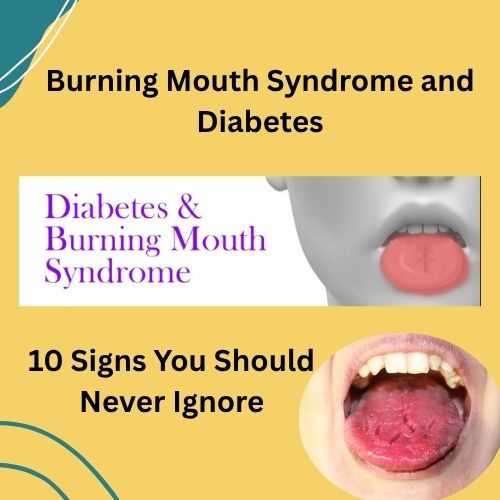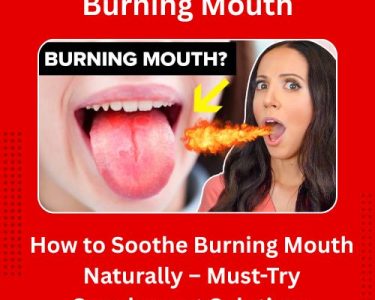Living with burning mouth syndrome and diabetes can be extremely challenging, especially when the two conditions interact and intensify each other’s symptoms. Many people with diabetes experience unexplained burning sensations in the mouth, tongue pain, or a persistent feeling of heat that doesn’t go away. Unfortunately, these symptoms are often overlooked, misdiagnosed, or dismissed as minor irritations — even though they could indicate deeper issues.
Some people even confuse diabetes-related oral burning with unrelated food reactions, such as Mouth Burning from Pineapple, which can feel similar at first but has a completely different cause. Understanding these differences is essential for protecting your oral health.
This in-depth guide reveals the 10 signs of burning mouth syndrome (BMS) in diabetic individuals that should never be ignored — along with the reasons they occur, the risks involved, and what you can do to find relief.
Understanding Burning Mouth Syndrome in Diabetic Patients
Burning mouth syndrome is a chronic condition characterized by:
- A burning or scalding feeling on the tongue
- Sensitivity on the lips or gums
- Dryness
- Metallic or bitter taste
- Numbness or tingling
It can occur with no visible signs, making it both confusing and frustrating.
For people with diabetes, this condition can be linked to:
- Nerve damage
- Poorly controlled blood glucose
- Dry mouth caused by reduced saliva
- Nutritional deficiencies
- Oral infections
- Medication effects
To make things clearer, let’s distinguish symptoms by type.
A Persistent Burning Sensation in the Mouth
The most classic sign of diabetes and burning mouth syndrome is a constant burning feeling that lasts for weeks or months.
This burning may:
- Intensify throughout the day
- Feel worse after meals
- Improve temporarily when eating or drinking
- Appear without visible sores
Some individuals confuse this discomfort with irritation from acidic or spicy foods, which leads them to search for guidance like how to avoid having a burning mouth after eating spicy food, but diabetes-related burning is typically more persistent.
Burning That Gets Worse With High Blood Sugar
One of the strongest indications of burning mouth syndrome and type 2 diabetes is a burning sensation that worsens when blood glucose rises.
High glucose levels can:
- Damage the nerves supplying the tongue and oral tissues
- Reduce saliva production
- Change taste perception
- Increase oral infections such as thrush
Fluctuating glucose levels may also trigger burning episodes unpredictably.
A Dry, Sticky, or Cotton-Like Mouth
Diabetes is known for causing dry mouth due to changes in salivary gland function. Reduced saliva can make burning sensations much more severe.
Dry mouth may also:
- Increase the risk of ulcers
- Reduce natural mouth lubrication
- Create an ideal environment for fungal infections
People who struggle with this dryness sometimes turn to lifestyle advice similar to burning mouth syndrome lifestyle and natural home remedies, especially when looking for temporary soothing techniques.
Changes in Taste: Bitter, Metallic, or “Chemical” Flavors
Taste disturbances are extremely common in diabetic individuals with BMS. You might notice:
- Bitter taste
- Metallic taste
- A strange sweet taste
- Reduced ability to taste certain foods
These changes may worsen the burning sensation and make eating difficult.
Burning That Appears After Drinking Alcohol
Many diabetic patients report their symptoms worsening after consuming alcohol. Alcohol irritates the mouth’s tissues, dehydrates the body, and interacts with glucose regulation.
Some people describe symptoms similar to burning mouth syndrome, after drinking alcohol mouth feels sore or inflamed. This worsening effect is especially noticeable in those whose glucose levels spike after alcohol intake.
Nutrient Deficiencies That Trigger Oral Burning
Diabetes can interfere with nutrient absorption, causing deficiencies in:
- Vitamin B12
- Folate
- Iron
- Zinc
These deficiencies damage nerves and increase oral sensitivity, making mouth burning more severe.
If these deficiencies go unaddressed, BMS can become chronic and difficult to reverse.
Nerve Damage (Diabetic Neuropathy) Affecting the Tongue
Diabetic neuropathy is the same complication responsible for tingling in the feet and hands — but it can also affect the mouth.
Nerve damage in the tongue can produce:
- Burning
- Tingling
- Numbness
- Increased sensitivity to heat or acidic foods
This neuropathic burning often does not improve even after drinking water or eating, making it one of the most severe symptoms.
Oral Infections That Mimic Burning Mouth Syndrome
People with diabetes are more prone to fungal infections like oral thrush. These infections cause burning sensations mistaken for BMS.
You may have thrush if you experience:
- White patches inside the mouth
- Raw or red areas
- Soreness when eating
- Increased burning after sugar intake
Clearing infections often reduces burning dramatically.
Stress, Anxiety, and Hormonal Imbalances Intensifying the Burning
Stress impacts diabetic patients intensely and can worsen nerve sensitivity, saliva production, and overall pain tolerance.
Hormonal changes — particularly during menopause — can also trigger BMS symptoms.
This is why relaxation strategies, holistic methods, and comfort-focused remedies related to natural remedies for burning mouth syndrome may provide temporary relief for some patients, though they do not replace diabetes management.
Burning That Does Not Match Food-Related Irritation
Many people mistake diabetic burning for irritation caused by spicy or acidic foods. For example:
- Citrus fruits
- Vinegar-based foods
- Tomatoes
- Spices
- Hot sauces
However, diabetic burning is deeper, lasts longer, and often appears without eating any triggering foods.
Some individuals even compare it to the discomfort felt in mouth burning from pineapple, but unlike fruit-related irritation, diabetic BMS continues long after eating stops.
Why Burning Mouth Syndrome Is More Common in Type 2 Diabetes
Several mechanisms make people with type 2 diabetes particularly vulnerable to BMS:
Nerve Damage
Chronic high glucose damages the nerves controlling taste and oral sensitivity.
Reduced Saliva
Dry mouth intensifies burning sensations dramatically.
Immune Changes
People with diabetes are more prone to infections that cause burning.
Systemic Inflammation
Inflammation increases tissue sensitivity and prevents healing.
Higher Stress Levels
Managing a chronic condition increases psychological stress, which worsens BMS.
This makes burning mouth syndrome and type 2 diabetes a particularly complex combination requiring careful attention.
How Burning Mouth Syndrome Differs From Food-Related Burning
To understand your symptoms accurately, compare diabetic burning to common food triggers:
Food-related burning
- Temporary
- Caused by acids, enzymes, or spices
- Improves after rinsing the mouth
- Often predictable
Diabetes-related burning
- Persistent or chronic
- Caused by nerve damage and metabolic changes
- Does not go away easily
- Often unpredictable
For this reason, diabetic individuals may seek general oral comfort strategies similar to natural treatment for burning mouth syndrome, especially when symptoms become chronic.
Treatment Options: What Actually Helps Diabetic Patients?
Treating BMS in diabetes requires a multi-layered approach:
Improve Blood Sugar Control
Keeping blood glucose stable reduces nerve irritation and dryness.
Correct Nutritional Deficiencies
Restoring vitamins and minerals can dramatically reduce symptoms.
Manage Dry Mouth
Hydration, sugar-free gum, and saliva substitutes can help.
Treat Fungal or Bacterial Infections
Clearing infections often eliminates burning entirely.
Support Nerve Health
Alpha-lipoic acid and B-complex vitamins are often used.
Psychological Stress Reduction
Stress management can significantly improve symptoms.
Some individuals also explore alternative comfort measures or supplements like Burnical herbal supplement for burning in the mouth, though its effects vary person to person.
Lifestyle Modifications That Help Reduce the Burning
Many patients find relief through simple daily changes. These may align with general strategies found in burning mouth syndrome lifestyle and natural home remedies, though diabetic treatment must always be personalized.
Effective modifications include:
- Avoiding acidic foods
- Reducing spicy meals
- Limiting alcohol
- Drinking more water
- Maintaining good oral hygiene
- Avoiding mouthwashes with alcohol
Are Home Remedies Effective?
Some diabetic individuals find temporary comfort in gentle remedies inspired by principles found in natural treatment for burning mouth syndrome, such as:
- Cool water rinses
- Ice chips
- Baking soda rinses
- Aloe vera gel
- Honey (only if diabetes is well controlled)
These remedies do not cure BMS but can ease discomfort.
When to See a Doctor Immediately
You should never ignore burning mouth symptoms if you experience:
- Sudden worsening with no clear cause
- Burning that interferes with eating
- Taste loss
- Difficulty swallowing
- White patches in the mouth
- Weight loss
- Uncontrolled blood glucose
- Tingling or numbness spreading to other areas
Persistent burning may indicate nerve damage or infection — both require treatment.
Final Thoughts: Don’t Ignore the Warning Signs
Burning mouth symptoms in diabetic individuals may seem minor at first, but they can be early warning signs of:
- Nerve damage
- Systemic inflammation
- Fungal infections
- Nutritional deficiencies
- Poorly controlled glucose
Recognizing these signs early helps prevent serious complications.
Whether you have occasional irritation or chronic discomfort, understanding the connection between burning mouth syndrome and diabetes empowers you to take action before problems escalate.




